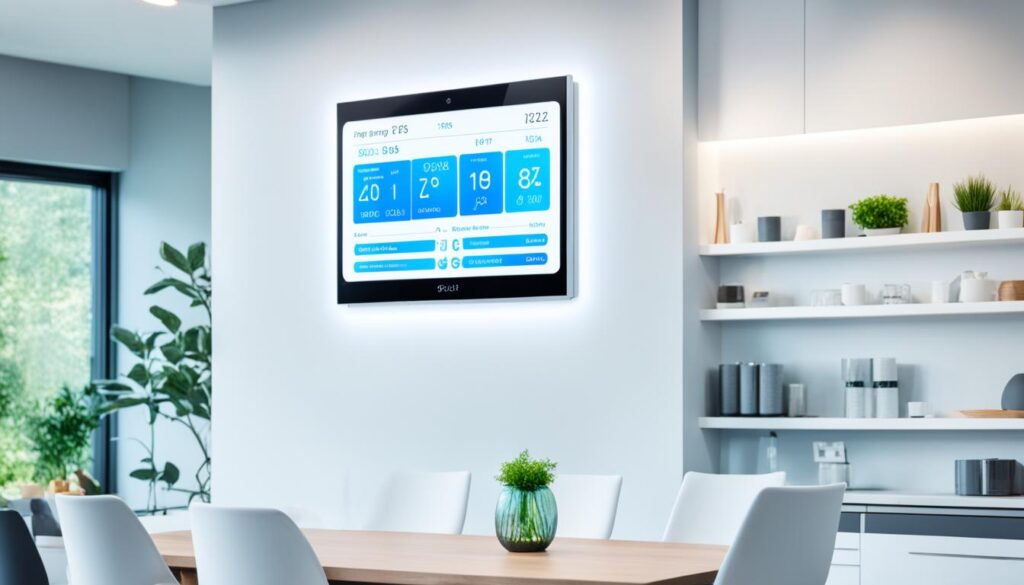Key Takeaways
- The future of home living is likely directed towards automation.
- The idea of a smart home has entered the mainstream and is not just for the tech-savvy.
- A smart home promises efficiency, security, and convenience.
- It’s crucial to consider the issues with smart home technology alongside its benefits.
- The choice between a smart home vs. a traditional home is a highly debated topic.
Understanding Smart Home Features and Automation
When we talk about smart homes, we’re exploring a world that once existed only in the realm of science fiction. Today, it’s a reality for many of us. But what exactly is a smart home, and what does it entail? What can we expect in terms of smart home features and benefits, and how does IoT technology play into all of this?
What Is a Smart Home?
A smart home is a residential setting equipped with various interconnected devices and systems ingeniously designed to automate and streamline household tasks. Central to this innovative ecosystem is a hub, a technological marvel that enables all the devices to communicate, interact, and work together to achieve a common goal—a safer, more efficient, and more convenient home. Now let’s get a visual clue of what we’re dealing with when it comes to smart homes:

How Smart Home Technology Is Changing the Home Experience
Imagine being able to control your air conditioning, lighting system, or home security, all with the press of a button or through voice commands. Smart home features enable homeowners to do this and so much more, at home or afar. The convenience factor is undeniable, but the improvements go beyond that. For instance, by automating lighting and temperature controls, one can significantly enhance energy efficiency. Thanks to the benefits of smart homes, the transformation extends into our daily routines as well. Now, we can remotely monitor our home security, check whether we left appliances on, and even schedule the coffee machine to prepare our morning brew just as we wake up.
The Role of the Internet of Things (IoT) in Home Automation
The Internet of Things (IoT) is the backbone of what makes a home ‘smart’. Essentially, IoT is a network of interconnected devices capable of collecting and exchanging data in real-time, a feature instrumental in automating tasks at home.
| Smart Home Device | Benefit |
|---|---|
| Smart Thermostat | Improves energy efficiency by automatically adjusting the temperature based on your schedule and preferences |
| Smart Security Camera | Enhances home security by allowing remote monitoring and sending alerts when unusual activity is detected |
| Smart Lights | Increases convenience and safety by enabling remote control of lighting and automatic activation in response to movement or time of day |
| Smart Appliances | Reduces energy usage and adds convenience by allowing scheduling of tasks at off-peak energy times and sending maintenance alerts |
In conclusion, it’s clear that home automation systems are radically changing how we live and interact within our homes. As they become more commonplace in the market, it’s important for anyone considering this technology to comprehend its workings, control extent fully, and transformative impact.
Evaluating the Pros and Cons of Smart Home
The possibilities and challenges of home automation are ample. As we explore smart home advantages and drawbacks, we aim to present a well-rounded understanding of home automation technology, paving the way for an informed decision.

Home automation brings notable benefits like convenience, improved efficiency, and better security. Imagine effortlessly controlling your home’s temperature, lights, and appliances from anywhere, saving on energy costs and helping the environment in the process. Smart home security features also offer peace of mind by alerting homeowners to dangers like gas leaks or intrusions, potentially increasing property value and offering insurance advantages. However, there are challenges, including cybersecurity risks with more devices meaning more chances for hacking, requiring strong security measures. The initial costs can be high, deterring some users, and these systems rely on continuous power and internet, with outages causing potential issues. Also, the complexity of these systems means a steeper learning curve and maintenance efforts. Addressing these challenges is key to fully enjoying the benefits of smart homes.
| Pros | Cons |
|---|---|
| Convenience and Control | Cybersecurity Risks |
| Efficiency and Energy Savings | High Initial Investment |
| Enhanced Security Features | Dependence on Power and Internet |
| Increased Home Value and Insurance Incentives | Learning Curve and Maintenance |
As we navigate the spectrum of smart home advantages and challenges, it becomes vital to weigh the pros and cons based on individual needs and circumstances. The journey towards a smart home must be navigated with caution and an understanding of these nuances.
The Financial Implications of Smart Home Technology
Immersing one’s home in the modern world of technology is not without cost. Depending on the extent and complexity of the chosen smart home system, the initial investment can vary greatly, dipping into the thousands. However, it’s worth considering the potential benefits of long-term savings on utility bills, the allure of boosting your property value, and even lower insurance premiums.

Initial Investment vs. Long-Term Savings
When evaluating the pros and cons of smart home systems, it’s important to weigh the significant upfront cost against the potential for savings over time. Improved energy efficiency, which is a feature of many smart systems, can help to reduce utility bills. Plus, the convenience offered by automated systems can further contribute to long-term savings by affording homeowners more time to focus on their lives outside of managing household tasks.
Idea of Smart Homes Increasing Property Value
As smart home technology increasingly becomes a standard feature in modern residences, this innovation can contribute significantly to a property’s overall value. A home equipped with smart devices is often seen as more appealing, attracting potential buyers who value the blend of convenience and luxury offered by these advanced systems.
Smart Home Technology as a Factor in Insurance Premiums
Insurance companies have begun recognizing the value of smart home systems, particularly those with security features, and often offer reduced insurance premiums for properties equipped with such devices. This is due to the preventive nature of many of these smart systems, which can help to minimize claims, thereby benefiting both the homeowner and insurer alike. In conclusion, while the journey towards automating your home can initially seem steep, the potential financial and lifestyle benefits make it a worthwhile consideration. Furthermore, modern technology is increasingly becoming faster, cheaper, and smarter, making the integration of smart home devices a sound investment for many homeowners.
Conclusion
Smart homes present a dual narrative. On one side, they promise to revolutionize our living spaces with unmatched convenience, security, and efficiency, fulfilling our dreams of an optimized home environment. Yet, this vision is tempered by significant challenges, including the costs of installation, the learning curve for less tech-savvy individuals, and the risks of cybersecurity threats. The debate between smart and traditional homes doesn’t have a straightforward winner but requires a balanced consideration of these key aspects. Both industry experts and homeowners must navigate these factors carefully, recognizing that the future of smart homes lies in their ability to offer substantial benefits without being overshadowed by their drawbacks.
FAQs
What Is a Smart Home?
A smart home is a residential setting equipped with internet-connected devices that monitor, control, and automate functions such as lighting, temperature, and security remotely. It’s a part of the broader concept of home automation and IoT technology, providing homeowners with improved convenience, efficiency, and security.
How Is Smart Home Technology Changing the Home Experience?
Smart home technology is revolutionizing the home experience by enabling automated control of routine household tasks. More than just a convenience, these nuances also facilitate energy savings, greater security, and potential property value increment. However, it also introduces new challenges such as cybersecurity vulnerabilities and a significant initial investment.
What Is the Role of the Internet of Things (IoT) in Home Automation?
IoT is the backbone of home automation. It refers to the interconnection of household devices through the internet. This interconnectivity allows these devices to communicate with each other, gather data, learn from homeowner behavior, and perform tasks that increase home efficiency and convenience.
What Are the Pros and Cons of Having a Smart Home?
Pros include convenience, efficiency, increased security, potential property value increase, and insurance incentives. The cons include security risks due to potential cyberattacks, the learning curve for non-tech savvy users, dependability on power and internet connectivity, the complexity of setup, and the significant upfront cost.
What Is the Initial Investment vs. Long-Term Savings in Smart Home Technology?
Setting up a smart home often entails an upfront financial commitment that varies depending on the extent of the system. Despite the initial cost, it can lead to long-term savings by reducing utility bills through more efficient energy usage.
How Is the Idea of Smart Homes Increasing Property Value?
As the demand for home automation rises, homes equipped with smart technology are seen as more valuable in the real estate market. Appraisers are increasingly recognizing the added value of smart home features, which can contribute notably to property valuation.
How does Smart Home Technology Factor into Insurance Premiums?
Insurance companies are starting to consider smart home technology when pricing their policies. Homeowners with smart security systems are often offered lower premiums due to the systems’ preventative nature, minimizing potential claims.

